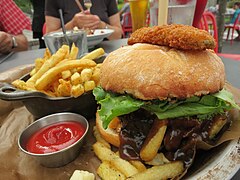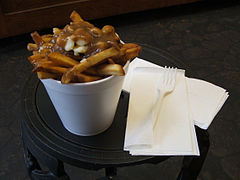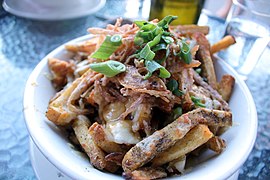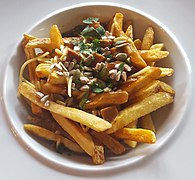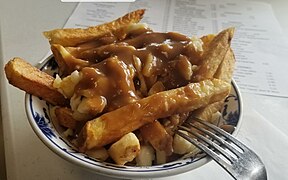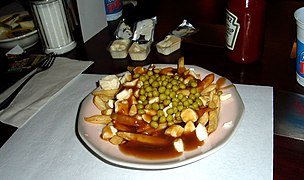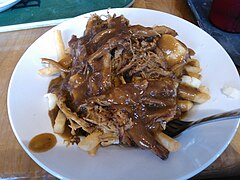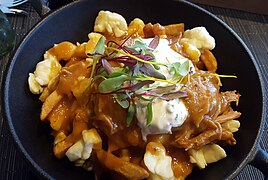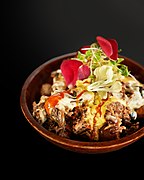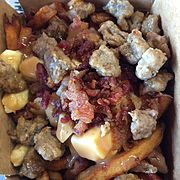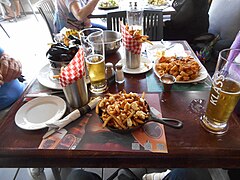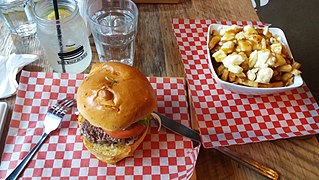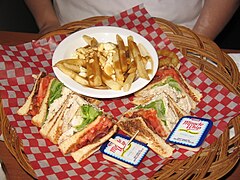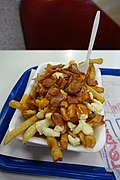Talk:Poutine/Archive 6
| This is an archive of past discussions about Poutine. Do not edit the contents of this page. If you wish to start a new discussion or revive an old one, please do so on the current talk page. |
| Archive 1 | ← | Archive 4 | Archive 5 | Archive 6 | Archive 7 |
Reorganization of §Cultural aspects
The following is an attempt to reorganize the Cultural aspect section by topic instead of chronologically:
Cultural aspect
|
|---|
|
A cultural marker, poutine had long been Quebec's adored junk food before spreading across the rest of Canada and the United States.[1][2][3] It had by then made inroads with food critics and established culinary circles, challenging its junk food status.[1] Food critic Jacob Richler noted in 2012 that Canadian dishes are too similar to their European roots to be considered original, with the exception of poutine, which he credited as the country's most famous culinary creation.[4] In May 2014, the word "poutine" was added to the Merriam-Webster Dictionary of the English language.[5] In 2007, the Canadian Broadcasting Corporation (CBC) declared the results of an online survey on the greatest Canadian inventions, in which poutine ranked at No. 10.[6] Maclean's 2017 survey of "favourite iconic Canadian food" placed poutine first with 21% of respondents, ahead of maple syrup with 14%.[7] By 2011, media outlets were reporting 11 April as National Poutine Day.[8][7][9]  In March 2016, poutine was served at the White House during the first state dinner hosted by President Barack Obama and Canada's Prime Minister Justin Trudeau.[10] Poutine has been a highlight of the London, UK, Canada Day celebrations in Trafalgar Square for several years,[11] and was a comfort food for the local community after the 2013 Lac-Megantic derailment.[12] The first poutine festival was held in Warwick, Quebec, in 1993. This annual event expanded to become the largest cheese festival in Canada.[13] In 2014, it was moved to the larger town of Victoriaville.[14] Montreal has hosted La Poutine Week, an annual festival, food tour, and competition held 1–7 February, since 2013.[15][16][17] Participating restaurants numbered over 100 in 2015.[18] In 2018, this grew to 170 restaurants in Montreal[19] plus another 70 in Quebec City, Toronto, Ottawa, Winnipeg, Regina, Edmonton and Vancouver.[20] Poutine festivals are also held in Drummondville (since 2008),[21][22][23] Ottawa-Gatineau,[1] Toronto,[7] Calgary,[24] Vancouver,[25] Quebec City and Sherbrooke.[26] Some US cities such as Chicago, IL,[27][28] Manchester, NH,[29] and Knoxville, TN, have also held festivals.[5][30] Since 2010, the International Federation of Competitive Eating (IFCE) has held a world poutine-eating championship sponsored by Toronto-based chain Smoke's Poutinerie. There was criticism that the inaugural contest was held outside of Quebec and excluded Québécois. The IFCE stated that Montreal poutineries had not expressed any interest in holding the competition. Regulations for contests in Quebec make it difficult to include the province, which is often absent from national contests.[31] Smoke's has since sponsored a cross-Canada poutine eating tour.[32] In 2011, chef Chuck Hughes won on Iron Chef America (episode 2 of season 9) by beating Bobby Flay with a plate of lobster poutine.[33] Jones Soda Co., originally a Canadian company now based in the US, created a poutine-flavoured limited-edition soft drink in 2013, which received international pop culture attention.[34] Bacon-poutine was one of four flavours selected as a finalist in the 2014 Lay's Canada Do Us A Flavour potato chip contest.[35] Though it did not win,[36] Lay's later added a bacon-poutine variety in its Canada entry for the World Flavourites.[37] Loblaws' President's Choice and Ruffles brands also offer poutine-flavoured potato chips in Canada.[38] Giapos Ice Cream of New Zealand has served a "poutine ice cream" of oolong matcha tea, ice cream and caramel sauce over hand-cut fries since 2017.[39] In a 2018 promotional campaign for the film Crazy Rich Asians, "the world's richest poutine" was created with wagyu steak, lobster, truffles, shiitake and chanterelle mushrooms, edible orchids, and gold flakes, priced just under $450.[40] References
|
Personnally I would run the last two paragraohs together, but otherwise it looks spot on to me. Gog the Mild (talk) 16:20, 6 June 2019 (UTC)
- Hmmm. Okay, those are all promotions, so they fit together. Revised article. – Reidgreg (talk) 16:49, 6 June 2019 (UTC)
image quality
The image in this article needs to be changed, it looks like french fries floating in coffee.(all of the threats of being blocked if if I do something wrong have scared me away)
- Adding time stamp for archival purposes. 13:11, 6 June 2019 (UTC)
I agree. I have never eaten poutine but it's pretty clear to me that the main article image isn't representing the dish well. The gravy is too thin and the cheese curds too large and few in number. – 15:35, 4 October 2019 (UTC) — Preceding unsigned comment added by 2600:100F:B110:3ABA:ED2F:EECF:9EE9:C7D0 (talk)
- The image had been changed since the original poster's comment. From what I've read, a traditional poutine (which we were trying to show) does use a thin chicken gravy, which will easily flow over the fries and give them a uniform coating. The size and proportion of cheese curds varies. The picture currently in the infobox was chosen as a result of this discussion. There is a general discussion on images for the article below. – Reidgreg (talk) 22:39, 4 October 2019 (UTC)
Images
I'd like to discuss the addition of images for the article. There was some previous discussion of picture suitability during the DYK process (which you can find here).

IP editor 75.164.180.8 (talk · contribs) has repeatedly added a picture of a tater-tot/mozzarella poutine, which is not mentioned in the text and does not illustrate the text it has been placed beside. The IP's edit summary states: "adding images to one of many sections without any images". Adding an image just to take up space doesn't seem like a great reason to me. I would like it to be removed, though I'm open to discussion
I feel that images should serve an encyclopedic purpose in illustrating the text. I'm looking to add an image of a poutine from La Banquise after I get some confirmation from the photographer. I feel that the article would particularly benefit from pictures of some of the gourmet poutines and the international poutines (e.g.: Haitian with plantain and spicy coleslaw, Cuban with yucca and cilantro) if these can be found.
Below are some images from Commons. Unfortunately, the image descriptions are often lacking. – Reidgreg (talk) 16:34, 16 August 2019 (UTC)
-
Pulled pork from Les 3 Brasseurs
-
La Banquise
-
California
-
Poutine hamburger
-
Vancouver
-
with onions
-
Minnesota
-
Poutine topped with eggs benedict
-
Poutine-benedict, Whistler, BC
-
Poutine poboy from Oak Street Po-Boy Festival, New Orleans
-
Georgie's Poutine
-
Halifax
-
Cheese Factory, Edmonton
-
Vegan poutine, London
-
New York
-
Poutine with peas, Le Club Sandwich, Montreal
-
Poutine with sausage at Chez Ashton, Quebec City (big enough to be cropped)
-
Pulled pork poutine from Whistler, BC
-
BBQ pork, smoked cheese, and herbs sour cream, Le Champlain, Quebec City
-
Poutine from Paris
-
Breakfast poutine
-
poutine with sausage and bacon
-
Poutine at Le Saint-Pub, Baie-Saint-Paul, QC
-
Notre Boeuf de Grace, QC
-
La Banquise; used as representative image on several other articles and wikis
-
A single serving of poutine from Le Madrid, QC
-
La Belle Province, QC
-
Poutine w/bacon, La Belle Province
- I agree with omitting the IP's tater tot concoction. Poutine derivatives are fine if they have context in the article, or even just to illustrate the versatile definitions of poutine, but this one is so far away from the original that it doesn't serve an encyclopedic purpose here. I mean, not everything that has any fried potato and any variety of cheese with gravy on it is a poutine, and this one seems like it was labelled poutine by the uploader. Ivanvector (Talk/Edits) 12:44, 17 August 2019 (UTC)
Pierogi Poutine

@Spudlace: Thanks for the picture of pierogi poutine (right). As you can see (above) there are an awful lot of potential pictures for this article. (I started this section to try to avoid edit-warring over pictures.) Perhaps we could even consider a gallery at the end of the article? I like having some representation from the prairies, BTW, but I'd appreciate a better description, both in the caption (and alt text) and on the file's description page. For the file page, I think you could add a little more from the Flikr source such as the restaurant name and which province Swift Creek is in (there is an article for the river Swift Creek (Manitoba)). I'd also appreciate a better description of the dish itself. It appears to be topped with bacon and green onions, but I couldn't make out the cheese component. Is it possible that these are cheese pierogi? If so, that doesn't really differ from a typical dish of pierogi (often served with bacon and green onions) except that brown gravy is substituted for the usual sour cream. – Reidgreg (talk) 13:58, 9 September 2020 (UTC)
- I don't mind if the photo is removed, but the restaurant name should not be added. I have no opinion on adding a gallery. Spudlace (talk) 14:31, 9 September 2020 (UTC)
Poutine Nation to be released in 2020
An IP added this to the article, which I'm noting here for possible future expansion. – Reidgreg (talk) 11:56, 23 July 2019 (UTC)
Canadian researcher Sylvain Charlebois announced that he is writing a book on poutine's unglamorous rise to global fame, called "Poutine Nation". The book will be released in 2020. La Presse
Update: It has been published in French. According to this April 2021 story in CTV News an English translation of the book fell through due to COVID-19. – Reidgreg (talk) 16:07, 13 February 2022 (UTC)
Is the page locked?
I was about to add to the "In politics" section that Maison de le Poutine is under pressure to drop the dish because it is spelled the same as Putin's name in French [1]. However, the page has no edit tab. Is it locked? If so, could someone with permission to edit it please put that item in? LachlanA (talk) 07:46, 8 March 2022 (UTC)
- @LachlanA: I requested page protection because there was some repeated editing without discussion and contrary to established consensus. Page protection expires on 11 March at 10:25 UTC. If you wish, you can place an Wikipedia:Edit request if you don't want to wait until then.
- I've split part of my reply into another section – Reidgreg (talk) 15:45, 11 March 2022 (UTC))
Putin v Poutine revisited
in reply to User:LachlanA
- I'd heard about the harassment at some of the restaurants with "Poutine" names in France. Of course, in Quebec this is old news – there were caricatures in the Quebec dailies when Vladimir Putin first came to international attention in the 1990s. I was going to wait until I got a copy of Poutine Nation to update the article, but I feel you're right, there's probably enough across the decades to add Vladimir to the article. – Reidgreg (talk) 06:54, 9 March 2022 (UTC)
- There are archived discussions Talk:Poutine/Archive 1 § Vladimir jokes and Talk:Poutine/Archive 2 § Poutine and Putin which mention an earlier version of the article which made the connection. The former mentions how artists Garnotte in Le Devoir and Serge Chapleau in La Presse (Canadian newspaper) drew caricatures in 1991 mocking the new presidency of then-unknown Putin. (He was Russia's fifth acting president in an 18-month period and people generally didn't expect much from him). Unfortunately, this was not well sourced and was removed from the article. I tried looking for with no success. I feel it'd be great if we could find something on this. – Reidgreg (talk) 02:22, 11 March 2022 (UTC)
- Here is a tentative writeup I've assembled. Still looking for a source on the 1991 caricatures. – Reidgreg (talk) 15:45, 11 March 2022 (UTC)
Proposed expansion re:politician
|
|---|
 In French, Russian president Vladimir Putin's surname is spelled "Poutine", with the two having identical pronunciation.[1][2] When Putin was appointed prime minister of Russia in 1999 and came to international attention, humour was immediately seen in Quebec with caricatures making puns in newspapers Le Devoir and La Presse.‹The template Fake citation needed is being considered for merging.› [citation needed] The similarity has also been a source of confusion; in commenting on the Talking to Americans prank on Bush, Washington Post columnist Al Kamen mistakenly believed that Mercer's fictional Jean Poutine was a reference to Putin.[3] In 2017, Russian-themed poutinerie Vladimir Poutine opened in Montreal, with dishes named for political figures from Rasputin to Donald Trump.[4] In the week following the 2022 Russian invasion of Ukraine, frequent insults and threats were received by the three Maison de la Poutine restaurants in Paris, some stating a belief that they worked for the Russian state. Another poutinerie in Lyon changed the name of its 20-year signature dish, Vladimir poutine, stating that it "was no longer funny". In Quebec, Le Roy Jucep announced that it was retiring the word poutine in support of Ukraine and reverted to "fromage-patate-sauce" on its menus and branding.[5][6][2] References
|
Putin caricatures
@JPxG: in your recent edit, you removed comments which effectively added a statement to the article. Just to be clear where it came from, that statement was paraphrased from the talk page at Talk:Poutine/Archive 1 § Vladimir jokes, which was posted by an editor who retired in 2009. That editor didn't add it to the article, and I'm not sure that either of us should add it to this good article without personally verifying it. (I appreciate that you did leave an inline tag.) I haven't had any luck finding them online. – Reidgreg (talk) 06:04, 27 March 2022 (UTC)
- @OnlyFixingProse: Just in case you missed this discussion, the sentence you removed (link to diff) was described on this talk page some years ago (noted above), with the publications and the artists but not the dates. It would probably have been around 1991. Unfortunately, the editor who noted it retired and none of us have actually seen the source, so I tend to agree with you that it probably shouldn't be in the article. – Reidgreg (talk) 01:42, 31 March 2022 (UTC)
Poutine is a Québécois dish
Hi everyone,
I don't understand why my edits providing clarity regarding poutine as a Québécois dish are undone when this is not even a debate anymore. All credible sources are used, even a recent one from the BBC (https://www.bbc.com/travel/article/20210505-why-only-quebec-can-claim-poutine).
Best Axolotlxl (talk) 18:37, 12 March 2022 (UTC)
- Not sure what the problem is ....does say it's a Quebec dish.....your edit simply adds a source in the lead and unlinks our main Canadian food article and seems to suggest that Quebec is a country.Moxy-
 18:46, 12 March 2022 (UTC)
18:46, 12 March 2022 (UTC)
- Not my intention of suggesting that Quebec is a country. For example, I think it is clearer to present the dish as: "It emerged in Quebec, in the late 1950s in the Centre-du-Québec region, though its exact origins are uncertain and there are several competing claims regarding its invention within the region." Don't you agree ? Axolotlxl (talk) 19:33, 12 March 2022 (UTC)
- (edit conflict)@Axolotlx: Your edits have been reverted because they ignore previous editorial consensus. I swear, every couple months someone comes boldly editing on this same point, and starts up an edit war without bothering to read the talk page. At the top of the banners on this page, there is a thin banner says "Talk:Poutine/FAQ", click on [show] to the right and read it. Between that and the wikicomments right in the text, I'm not sure what else to do except maybe add an editnotice.
- Poutine originated in Quebec. It is "associated with Quebec cuisine" and has been "called Canada's national dish". That's all in the lead, referenced in the body and undisputed. But when you talk about national cuisines that opens a huge can of worms and irresolvable arguments that just aren't a good investment of editor time. The article would not have passed GA status due to edit warring if we hadn't decided for it to not state a position on cuisine nationality. I could probably write a few pages about cuisine nationality but again, not worth the time.
- If you really want this in the article, I suggest you call another RfC and see if a new consensus has emerged at this time (it's been about three years since the last substantial debate). Obviously, I do not feel this would be worthwhile.
- Oh, for your proposal above, no, I think the addition of the bolded words is a redundancy that we don't need in the lead. A few excellent copy-editors have gone over this article, btw. – Reidgreg (talk) 20:01, 12 March 2022 (UTC)
- Thanks for your reply. Regarding national cuisines, there is a clear consensus about Quebecois national cuisine. Here is a whole page about it: Quebecois cuisine. I don't see how it would be controversial to specify the right national context to which poutine actually belongs. Axolotlxl (talk) 03:35, 13 March 2022 (UTC)
- Take a look at WP:LAME for a few examples of how nationality can be the subject of edit warring, and how seemingly obvious matters can lead to entrenched, circular arguments. That's what I'm trying to stop from happening here. If you still don't believe me, once again, I ask you to read the talk pages, and maybe go through the edit history while you're at it. If you can't do that, and if you can't accept that your position is a point-of-view and not absolute truth, I don't see this discussion going anywhere. – Reidgreg (talk) 14:22, 13 March 2022 (UTC)
- Thanks, I finally went through it all. The thing is, this is clearly no debate. Quebec has its own culture and national identity and national cuisine, which poutine is part of. This is the foundation of all the articles published on the topic of “why only Quebec can claim poutine”. Also, Quebec is officially recognized a nation. Again, a whole Wikipedia page exists about Quebec national cuisine (Québécois cuisine). If you can read French, take a look at the Wikipedia page written in French to see how deep this cuisine is. At that point, to be consistent with your point-of-view, should we ask that the Quebecois cuisine page be shut down because some are uncomfortable with the fact that Quebecois national cuisine exists? With all the articles written on this very topic using poutine as an example, and with all due respect, denying the existence of Quebecois cuisine is kind a denying Quebecois national identity as a whole. I’m sure this is not your intention, but I’m curious if you or others from this page want to help bring forward Quebecois cuisine on this page? @Reidgreg + @Moxy Axolotlxl (talk) 16:52, 2 April 2022 (UTC)
- No guess work about Canadian culture we call that WP:OR. Moxy-
 23:48, 2 April 2022 (UTC)
23:48, 2 April 2022 (UTC)
- Guess work ? This was approved by the House of Commons of Canada on Monday, November 27, 2006 see: Québécois nation motion: "That this House recognize that the Québécois form a nation within a united Canada." Axolotlxl (talk) 00:27, 3 April 2022 (UTC)
- I'm aware. I just don't feel that your edit is enough of an improvement on the current version of the article (which I feel is pretty even-handed) to be worth all the drama that it's going to bring. If you're crusading for recognition of Quebec cuisine, I would direct you to WP:GREATWRONGS. BTW, Fabien-Ouellet, one of the experts cited in the article, has taken the stance that there may be no such thing as national cuisines, only regional cuisines, with poutine being a cuisine of the Centre-du-Quebec region rather than Quebec as a whole. Are you prepared to have that added to the argument? (I hope to work on this and update the article after I get access to a copy of Poutine Nation.) – Reidgreg (talk) 03:03, 3 April 2022 (UTC)
- I understand, I'll try to get a hold on Poutine Nation too and other published sources to see if the edits with Québécois cuisine still make sense or if we should simply keep the current consensus. Not sure what we do with sources written in French, but I guess we will see later. Axolotlxl (talk) 13:43, 3 April 2022 (UTC)
- I'm aware. I just don't feel that your edit is enough of an improvement on the current version of the article (which I feel is pretty even-handed) to be worth all the drama that it's going to bring. If you're crusading for recognition of Quebec cuisine, I would direct you to WP:GREATWRONGS. BTW, Fabien-Ouellet, one of the experts cited in the article, has taken the stance that there may be no such thing as national cuisines, only regional cuisines, with poutine being a cuisine of the Centre-du-Quebec region rather than Quebec as a whole. Are you prepared to have that added to the argument? (I hope to work on this and update the article after I get access to a copy of Poutine Nation.) – Reidgreg (talk) 03:03, 3 April 2022 (UTC)
- Guess work ? This was approved by the House of Commons of Canada on Monday, November 27, 2006 see: Québécois nation motion: "That this House recognize that the Québécois form a nation within a united Canada." Axolotlxl (talk) 00:27, 3 April 2022 (UTC)
- No guess work about Canadian culture we call that WP:OR. Moxy-
- Thanks, I finally went through it all. The thing is, this is clearly no debate. Quebec has its own culture and national identity and national cuisine, which poutine is part of. This is the foundation of all the articles published on the topic of “why only Quebec can claim poutine”. Also, Quebec is officially recognized a nation. Again, a whole Wikipedia page exists about Quebec national cuisine (Québécois cuisine). If you can read French, take a look at the Wikipedia page written in French to see how deep this cuisine is. At that point, to be consistent with your point-of-view, should we ask that the Quebecois cuisine page be shut down because some are uncomfortable with the fact that Quebecois national cuisine exists? With all the articles written on this very topic using poutine as an example, and with all due respect, denying the existence of Quebecois cuisine is kind a denying Quebecois national identity as a whole. I’m sure this is not your intention, but I’m curious if you or others from this page want to help bring forward Quebecois cuisine on this page? @Reidgreg + @Moxy Axolotlxl (talk) 16:52, 2 April 2022 (UTC)
- Take a look at WP:LAME for a few examples of how nationality can be the subject of edit warring, and how seemingly obvious matters can lead to entrenched, circular arguments. That's what I'm trying to stop from happening here. If you still don't believe me, once again, I ask you to read the talk pages, and maybe go through the edit history while you're at it. If you can't do that, and if you can't accept that your position is a point-of-view and not absolute truth, I don't see this discussion going anywhere. – Reidgreg (talk) 14:22, 13 March 2022 (UTC)
- Thanks for your reply. Regarding national cuisines, there is a clear consensus about Quebecois national cuisine. Here is a whole page about it: Quebecois cuisine. I don't see how it would be controversial to specify the right national context to which poutine actually belongs. Axolotlxl (talk) 03:35, 13 March 2022 (UTC)
- Not my intention of suggesting that Quebec is a country. For example, I think it is clearer to present the dish as: "It emerged in Quebec, in the late 1950s in the Centre-du-Québec region, though its exact origins are uncertain and there are several competing claims regarding its invention within the region." Don't you agree ? Axolotlxl (talk) 19:33, 12 March 2022 (UTC)




